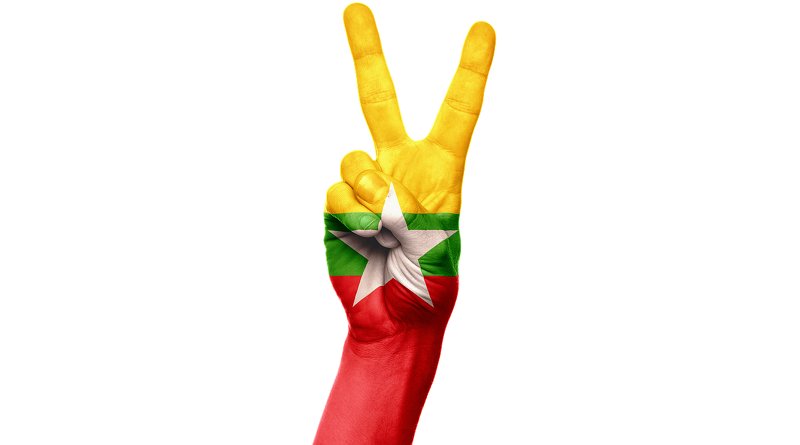CEBU CITY—The Association of Southeast Asian Nations (Asean) does not recognize the recently held elections in Myanmar, the first since the army...
Vous n'êtes pas connecté
- English
- Français
- عربي
- Español
- Deutsch
- Português
- русский язык
- Català
- Italiano
- Nederlands, Vlaams
- Norsk
- فارسی
- বাংলা
- اردو
- Azərbaycan dili
- Bahasa Indonesia
- Հայերեն
- Ελληνικά
- Bosanski jezik
- українська мова
- Íslenska
- Türkmen, Түркмен
- Türkçe
- Shqip
- Eesti keel
- magyar
- Қазақ тілі
- Kalaallisut ; kalaallit oqaasii
- Lietuvių kalba
- Latviešu valoda
- македонски јазик
- Монгол
- Bahasa Melayu ; بهاس ملايو
- ဗမာစာ
- Slovenščina
- тоҷикӣ ; toğikī ; تاجیکی
- ไทย
- O'zbek ; Ўзбек ; أۇزبېك
- Tiếng Việt
- ភាសាខ្មែរ
- རྫོང་ཁ
- Soomaaliga ; af Soomaali
Rubriques :
 Maroc - EURASIAREVIEW.COM - A la une - 26/02/2025 01:19
Maroc - EURASIAREVIEW.COM - A la une - 26/02/2025 01:19
Remaking Myanmar Will Be Slow And Painful – OpEd
Four years on from the military coup that deposed the National League for Democracy government elected in Myanmar’s November 2020 elections, the civil conflict that emerged in the coup’s aftermath remains deadlocked. The brutal State Administrative Council (SAC) military junta has clung to power despite facing a determined but fragmented resistance. This resistance includes civilian militias known as people’s defence forces (PDFs), the so-called ethnic armed organisations (EAOs) that are the de facto governing authorities throughout much of the country’s periphery, and the National Unity Government — a government-in-exile composed of politicians elected in 2020. That the resistance has endured this long is impressive, and its control of up to half the country’s territory is even more so. Yet, as Nicholas Farrelly writes in this week’s lead article, despite Myanmar’s rolling economic crisis, the junta’s military losses in the periphery and its inability to suppress civilian militias in the ethnic Bamar heartland, ‘[t]he generals in Naypyitaw could hobble on in this fashion, potentially for years. The history of mismanaged military dictatorship in Myanmar suggests that this is a highly plausible scenario.’ Continuing conflict serves no one’s interest — not even the generals’. They have pinned their hopes on fresh elections designed ‘to rebuild their authority and create some greater legitimacy, including for diplomacy through ASEAN.’ These elections would likely be a precursor to installing an outwardly civilianised but military-controlled government in the mould of that which governed Myanmar from 2010 to 2015. ASEAN’s mainland Southeast Asian members, Farrelly says, ‘would certainly welcome such rehabilitation [for the junta], but the fact is that any such regime-endorsed election would also be immediately dismissed as flawed and undemocratic.’ The question arises, though: dismissed by whom? SAC-engineered polls would have no credibility and would undoubtedly be condemned by the resistance and by objective observers abroad. But Farrelly notes that there will be powerful incentives for regional governments to look the other way, not least ASEAN’s mainland Southeast Asian members, whose elites have long had close political and economic ties to the Myanmar military. For now, ASEAN is sticking to the script under the chair of Malaysia, which has been vocal since the coup on the importance of restoring democratic rule in Myanmar. The recent ASEAN foreign ministers’ meeting in Langkawi concluded that elections in Myanmar should not be a priority. Instead, they emphasised continued dialogue as per the April 2021 Five-Point Consensus — which remains ASEAN’s rhetorical touchstone for addressing the crisis, even if its members harbor no illusions about the junta’s good faith engagement with it. The big test for ASEAN will come if or when the junta proceeds with sham elections anyway, forcing it to decide collectively whether to use the polls as a pretext to bring the regime in from the cold or risk splits among its members on that question. At the conflict’s outset, China was caught between a rock and a hard place — not wanting chaos but unwilling to back one side too heavily in an unpredictable conflict. It has engaged as its interests dictate, cooperating at times with the ethnic armed organisations who are fighting the junta while maintaining diplomatic ties with Naypyitaw. Recently, China claimed credit for facilitating a ceasefire agreement between the SAC and the Myanmar National Democratic Alliance Army, one of the organisations involved in the stunning October 2023 offensive that seemed, for a while, to put the junta on the back foot strategically. China-brokered agreements between the central government and EAOs may remove a crucial military element of the resistance, weakening opposition to the junta’s rule. If Beijing seeks to intervene further to broker ‘peace’ between the parties to the conflict in 2025, it will be read as a sign that it has come to see its interest in removing obstacles for the reassertion of the junta’s dominance. Whatever happens, stability along the China–Myanmar border and the protection of Chinese economic interests, including infrastructure projects under the Belt and Road Initiative, take precedence over a particular political outcome, any expedient dealings with elements of the resistance notwithstanding. A negotiated peace between the junta and the EAOs will not come without a price to pay from the SAC’s side. As Farrelly underscores, ‘the armies that have fought to secure their own territories will not simply turn over security and economic decision-making to a central government. They will want to control local resources, with extra influence over educational, linguistic, social and cultural outcomes. Balkanisation, however defined, is a part of today’s and tomorrow’s realities’. There is a lot that could still go wrong for the junta, and a lot that could still go right for the resistance. But the region needs to confront the fact that the effective break-up of the Myanmar state is a plausible political equilibrium that both the junta and the EAOs would settle for. Contained in the idea that there are ‘multiple futures’ for Myanmar is the possibility that there could be, in effect, multiple Myanmars. Source: This article was published by East Asia Forum. The EAF Editorial Board is located in the Crawford School of Public Policy, College of Law, Policy and Governance, The Australian National University.
Articles similaires
ASEAN refuses to recognize Myanmar's military-run elections
ASEAN will not endorse Myanmar's military-controlled elections, Foreign Affairs Secretary Theresa Lazaro said Thursday, January 29 — the bloc's...
The Problem With The South China Sea Code Of Conduct Is Not China: It’s ASEAN – Analysis
ASEAN reaffirmed the importance of maintaining and promoting peace, security, stability, safety, and freedom of navigation in and overflight above...
The Problem With The South China Sea Code Of Conduct Is Not China: It’s ASEAN – Analysis
ASEAN reaffirmed the importance of maintaining and promoting peace, security, stability, safety, and freedom of navigation in and overflight above...
Okamura not to succeed in cutting Ukraine aid, says Czech Senate Speaker
Czech support for Ukraine will not decrease significantly, although the voices of those who have long been critical of it are now being heard more...
ASEAN FMs to tackle Myanmar peace plan, elections in Cebu retreat
MANDAUE CITY – The peace plan and the recently concluded elections in Myanmar are among the pressing subjects foreign ministers from the...
Inside Myanmar’s five-year armed resistance – a photo essay
Five years after the junta’s coup, the civil war devastating Myanmar has reached a turning point. The military is carrying out large-scale...
How Myanmar Is Testing The Limits Of Atrocity Accountability – OpEd
By Dr. Azeem Ibrahim The most recent hearings in the Rohingya genocide case at the International Court of Justice did not revolve around disputed...
Trump alarmed legal scholar so much he abandoned the thesis of his own election book
President Donald Trump's attempts to take over the election system have so shocked a prominent legal expert that he has now abandoned the entire...
ASEAN does not recognise Myanmar’s elections ‘as of now’: Philippine FM
Philippine Foreign Secretary Lazaro says ASEAN member states have 'not endorsed' the election in military-run Myanmar.
Les derniers communiqués
-
Google brings more Gemini AI features to Chrome browser
GOOGLE - 02/02/2026
-
GM Canada at the 2026 Montreal International Auto Show
General Motors - 15/01/2026
-
Bank of America Reports Fourth Quarter 2025 Financial Results
Bank of America - 15/01/2026
-
organ Stanley Capital Partners Makes Majority Investment in Olsson, Inc.
Morgan stanley - 13/01/2026
-
Cadillac Formula 1® Team Unveils Special Edition Livery for Barcelona Shakedown
General Motors - 13/01/2026
-
confidence with new 12-month/12,000 mile warranty
General Motors - 13/01/2026
-
Siemens named a leader in Green Quadrant: Quality Management Software 2025 report
SIEMENS - 12/01/2026
-
American rings in the new year with non-alcoholic IPA, new cocktails and refreshed menus in ight
AMERICAN AIRLINES - 12/01/2026
-
American Airlines partners with award-winning Pecan Lodge to serve Texas barbecue on select flights from DFW to New York airports
AMERICAN AIRLINES - 09/01/2026
-
American Airlines and OBAP celebrate 50 years of progress and 100 years of flight
AMERICAN AIRLINES - 07/01/2026





